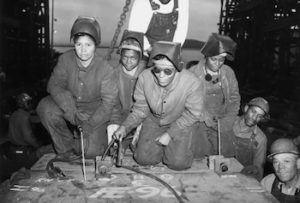
*Black women's history in welding and other government industries is affirmed on Pearl Harbor Day, 1941.
With the entry of the United States of America into World War II, Black women became vital to the war effort. Already on the move as part of the Great Migration, they sought to leave behind dead-end, often demeaning work as domestics and sharecroppers. Over half a million "Black women" worked alongside their white counterparts in the war effort.
Coming from throughout the United States, these Black women worked tirelessly in shipyards and factories, along railroads, inside administrative offices, and elsewhere to fight the foreign enemy of authoritarianism abroad and the familiar enemy of racism at home. At the peak of wartime industrial production, some 2 million women worked in war-related industries. Women were crucial in filling domestic war-related roles.
Gregory S. Cooke, director and a professor, said: "The war gave the women a more pointed motivation for leaving and an opportunity to make money in ways Black women had never dreamed before." "Black people were leaving the south anyway and fanning out across the country," Dr. Maureen Honey, emeritus professor of women's and gender studies at the University of Nebraska Lincoln, said: "The war represented this incredible opportunity, but Black women really had to rally and fight for the opportunity even to be considered, and Many employers held out, attempting only to hire white women or white men until they were forced to do otherwise."
That pressure came in the summer of 1941 when activists Mary McLeod Bethune and A. Phillip Randolph brought the widespread hiring discrimination to President Franklin Roosevelt, prompting the Commander-in-Chief to sign Executive Order 8802 banning racial discrimination in the defense industry. The Order boosted Black women's entry into the war effort; of the 1 million African Americans who entered paid service for the first time following 8802's signing, 600,000 were women.
During the war, Ruth Wilson left her job as a domestic and became a sheet metal worker at the Philadelphia Navy Yard, where she assembled ship bulkheads on the yard's dry dock. She said, "It made me feel good because my husband was over there in Europe fighting, and here I was doing my part, plus I made more money!" Despite equal pay regulations, black and white women were routinely paid 10 to 15 cents an hour lower than their male counterparts.
Across the nation, Black workers received fewer benefits and were barred from controlling union activities, with the shipbuilder's union blocking Black people from membership altogether. And at Wagner Electric, a factory in St. Louis, despite a diverse workforce composed of 64 percent white women and 24 percent Black men, there were no Black women. Willie Mae Govan, one of three Black women who made gunpowder for the E.I. DuPont Corporation in Childersburg, Alabama, described the sexual harassment she endured at the hands of white male bosses at her plant. This all happened while working a dangerous job, which Govan believes contributed to frequent and intense migraine headaches for much of her life.
Bernice Bowman, who worked at the U.S. General Accounting Office as a clerk typist, says despite frequent promotions for her white coworkers, she was never offered a chance for advancement. Wilson added: "The thing is, Black people, we were used to discrimination, so we just did our best to ignore it and kept pushing on." In 1945, in a written report compiled at the end of the war, Kathryn Blood, a researcher of the Department of Labor studying the wartime contributions of Black women, wrote the following about Black women: "The contribution of Black women is one which this nation would be unwise to forget or evaluate falsely."